7-Day No-Sugar Anti-Inflammatory Meal Plan for Metabolic Syndrome, Created by a Dietitian
Whether you have metabolic syndrome or are looking to reduce your risk, this no-added-sugar anti-inflammatory meal plan can help
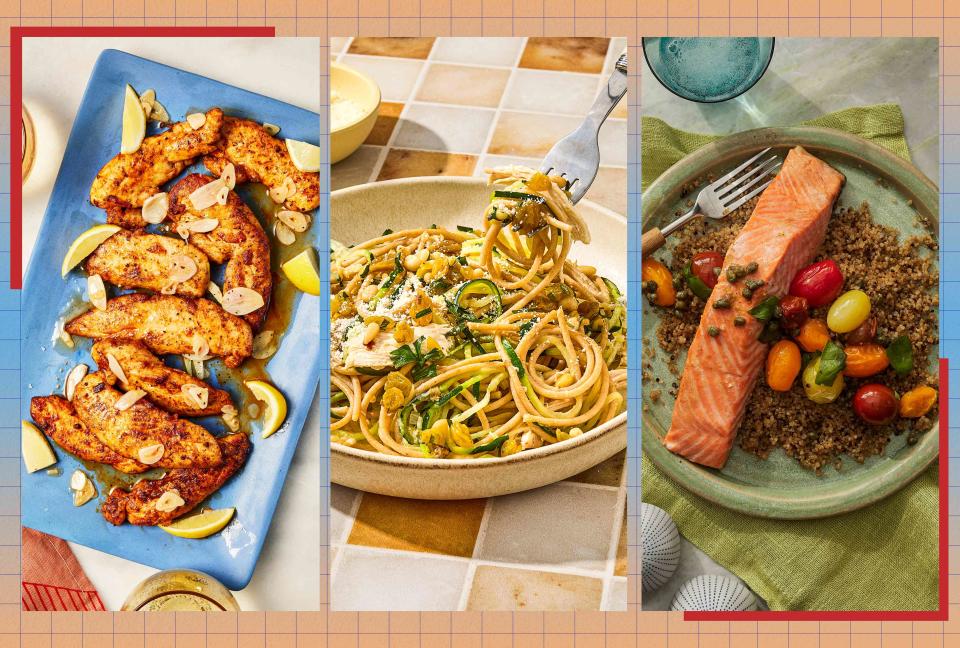
EatingWell
Reviewed by Dietitian Maria Laura Haddad-Garcia
Metabolic syndrome is a group of health conditions that can increase the risk of developing heart disease, type 2 diabetes and stroke. According to the National Heart, Lung and Blood Institute, if you have three of the following five conditions, you may have metabolic syndrome:
A larger waistline, or carrying more of your weight in your stomach
High blood pressure
High blood sugar levels
High triglycerides
Low HDL cholesterol
With so many conditions at play, it’s tricky to know where to start and what changes to make to best improve metabolic syndrome. Fortunately, simple strategies like cooking more meals at home, eating more heart-healthy fiber and increasing activity can help. Because chronic inflammation can increase the risk of some conditions that contribute to metabolic syndrome, we focus on foods that are linked to reducing inflammation, such as pigment-rich fruits and vegetables, nuts, seeds, fish and healthy fats, while omitting foods that may increase inflammation, like added sugars.
Related: Snacking on Nuts Daily May Reduce Metabolic Syndrome Risk Factors, New Study Shows
If you have overweight or clinical obesity, gradual weight loss can decrease the risk of developing metabolic syndrome, according to the American Heart Association. To facilitate weight loss, we set this plan at 1,500 calories per day, which is a level where many people will lose weight. For those with other calorie needs, we also included modifications for 1,200 and 2,000 calories per day. As with all meal plans, this is a framework for a healthy eating plan and doesn’t need to be followed exactly to reap the benefits. Focus on fiber-rich and anti-inflammatory ingredients and make substitutions as needed to tailor this plan so it works for you.
Strategies to Manage Metabolic Syndrome
Eat More Fiber: Fiber is linked to a reduced risk of type 2 diabetes, lower body weight and improved heart health—all factors that can impact metabolic syndrome. Plus, eating more fiber can help facilitate weight loss, even if no other deliberate changes are made. Foods rich in fiber include whole grains, fruits, vegetables, nuts, beans and lentils.
Exercise: Aim for at least 150 minutes a week of moderate-intensity exercise, such as brisk walking, according to the AHA. Exercising for 30 minutes most days of the week can have some serious benefits, though short bouts of walking can be impactful, too.
Reduce Inflammation: Reducing inflammation in the body may help facilitate weight loss and improve blood sugar levels. Strategies to reduce inflammation include eating more healthy fats (like avocado, nuts and seeds) fish and plant-based foods, improving gut health, reducing stress and improving sleep quality.
Reduce Added Sugars: Added sugars don’t need to be off the table completely, but it’s true that most of us eat more added sugars than we realize. Reducing added sugars can help limit excess unintended calories and leave more room for nutrient-dense foods, like fruits, vegetables and nuts.
Weight Loss: Gradual weight loss can help improve metabolic syndrome. Aiming to eat regular meals, including exercise and focusing on fiber are all helpful strategies that can promote weight loss.
Anti-Inflammatory Foods to Focus On
Fish
Fruits, especially richly pigmented fruit like berries, cherries and pomegranate
Vegetables
Legumes
Whole grains, like quinoa, oats, bulgur, freekeh, brown rice and more
Nuts, including natural nut butters made with two ingredients: nuts and salt
Seeds, such as chia, pumpkin and flax
Avocado
Olive oil
Fermented dairy, like yogurt and kefir
Herbs and spices
How to Meal-Prep Your Week of Meals
Make 20-Minute White Bean Soup to have for lunch on Days 2 through 5.
Prepare Overnight Oats with Chia Seeds to have for breakfast on Days 2 and 3.
Day 1
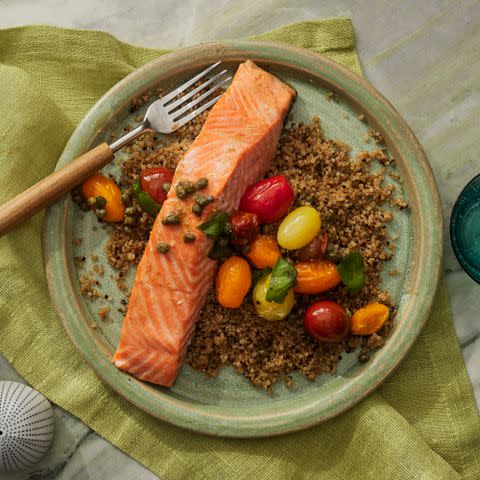
Photographer: Fred Hardy, Food Stylist: Jennifer Wendorf, Prop Stylist: Lydia Purcell
Breakfast (323 calories)
1 (5.3-oz.) container low-fat plain skyr yogurt
½ cup cherries, fresh or thawed from frozen
3 Tbsp. sliced almonds
1 Tbsp. chia seeds
A.M. Snack (131 calories)
1 large pear
Lunch (357 calories)
1 serving Chickpea Tuna Salad
P.M. Snack (95 calories)
1 medium apple
Dinner (600 calories)
Daily Totals: 1,505 calories, 70g fat, 82g protein, 143g carbohydrate, 30g fiber, 1,317mg sodium
Make it 1,200 calories: Omit sliced almonds at breakfast, and change A.M. snack to ¼ cup raspberries and P.M. snack to ¼ cup blueberries.
Make it 2,000 calories: Add ¼ cup unsalted dry-roasted almonds to A.M. snack, add 1 medium banana to lunch and increase to 2 Tbsp. almond butter at P.M. snack.
Day 2
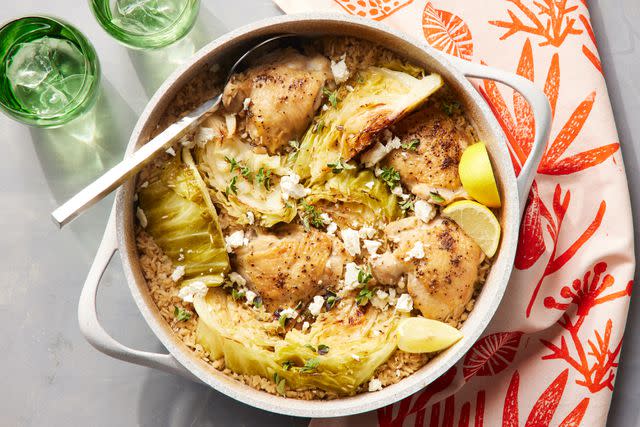
Photographer: Jacob Fox, Food stylist: Holly Dreesman, Prop stylist: Joseph Wanek
Breakfast (390 calories)
1 serving Overnight Oats with Chia Seeds
A.M. Snack (140 calories)
1 cup low-fat plain kefir
1 plum
Lunch (346 calories)
1 serving 20-Minute White Bean Soup
1 medium bell pepper, sliced
2 Tbsp. hummus
P.M. Snack (193 calories)
1 medium apple
1 Tbsp. almond butter
Dinner (418 calories)
1 serving One-Pan Chicken & Cabbage with Rice
Daily Totals: 1,482 calories, 61g fat, 71g protein, 180g carbohydrate, 36g fiber, 1,685mg sodium
Make it 1,200 calories: Omit kefir at A.M. snack and change P.M. snack to ½ cup blueberries.
Make it 2,000 calories: Add a 5.3-oz. container low-fat plain skyr yogurt to breakfast and ¼ cup unsalted dry-roasted almonds to A.M. snack, increase to 2 Tbsp. almond butter at P.M. snack and add 1 serving Tart Cherry Nice Cream as an evening snack.
Day 3
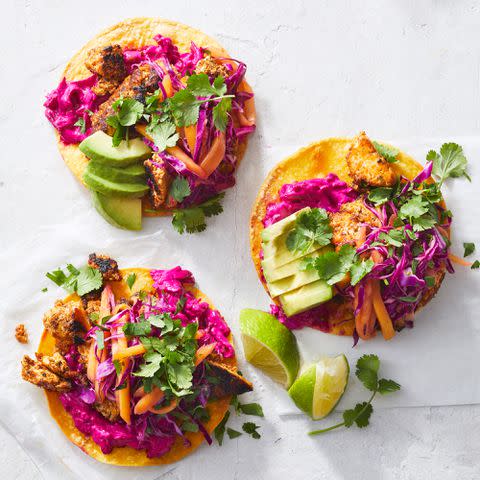
Breakfast (390 calories)
1 serving Overnight Oats with Chia Seeds
A.M. Snack (144 calories)
1 (5.3-oz.) container low-fat plain skyr yogurt
¼ cup blueberries
Lunch (346 calories)
1 serving 20-Minute White Bean Soup
1 medium bell pepper, sliced
2 Tbsp. hummus
P.M. Snack (214 calories)
2 large hard-boiled eggs
1 medium peach
Dinner (432 calories)
Daily Totals: 1,521 calories, 70g fat, 75g protein, 160g carbohydrate, 37g fiber, 1,459mg sodium
Make it 1,200 calories: Omit skyr yogurt at A.M. snack and change P.M. snack to 1 plum.
Make it 2,000 calories: Add ¼ cup unsalted dry-roasted almonds to A.M. snack, increase to 3 Tbsp. hummus at lunch and add 1 serving Guacamole Chopped Salad to dinner.
Day 4
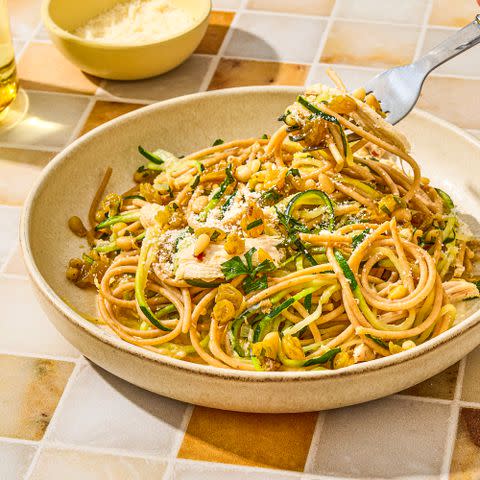
Ali Redmond
Breakfast (280 calories)
1 slice sprouted-wheat bread, toasted
1 Tbsp. almond butter
1 cup low-fat plain kefir
A.M. Snack (131 calories)
1 large pear
Lunch (346 calories)
1 serving 20-Minute White Bean Soup
1 medium bell pepper, sliced
2 Tbsp. hummus
P.M. Snack (265 calories)
¼ cup unsalted dry-roasted almonds
1 medium peach
Dinner (470 calories)
1 serving Agrodolce Zucchini & Chicken Pasta
Daily Totals: 1,492 calories, 56g fat, 78g protein, 184g carbohydrate, 33g fiber, 1,385mg sodium
Make it 1,200 calories: Change A.M. snack to 1 plum and omit almonds at P.M. snack.
Make it 2,000 calories: Add 1 serving Strawberry-Banana Green Smoothie to breakfast and 1 serving Traditional Greek Salad to dinner.
Day 5
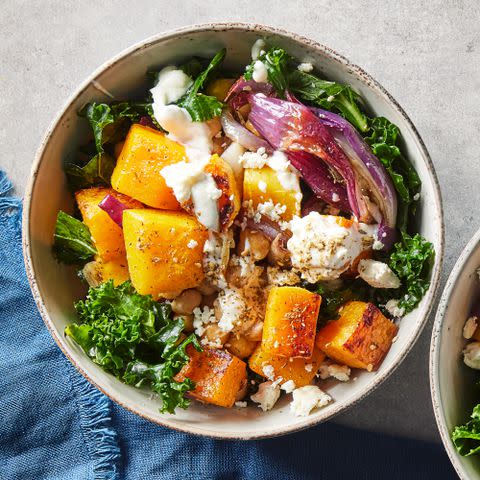
Photography: Rachel Marek, Food stylist: Kelsey Moylan, Prop stylist: Gabriel Greco
Breakfast (323 calories)
1 (5.3-oz.) container low-fat plain skyr yogurt
½ cup cherries, fresh or thawed from frozen
3 Tbsp. sliced almonds
1 Tbsp. chia seeds
A.M. Snack (193 calories)
1 medium apple
1 Tbsp. almond butter
Lunch (346 calories)
1 serving 20-Minute White Bean Soup
1 medium bell pepper, sliced
2 Tbsp. hummus
P.M. Snack (214 calories)
2 large hard-boiled eggs
1 medium peach
Dinner (404 calories)
Daily Totals: 1,479 calories, 65g fat, 71g protein, 166g carbohydrate, 38g fiber, 1,196mg sodium
Make it 1,200 calories: Omit almond butter at A.M. snack and omit hard-boiled eggs at P.M. snack.
Make it 2,000 calories: Increase to 2 Tbsp. almond butter at A.M. snack, and add ¼ cup unsalted dry-roasted pistachios to lunch, 1 serving Everything Bagel Avocado Toast to dinner and 1 serving Tart Cherry Nice Cream as an evening snack.
Day 6
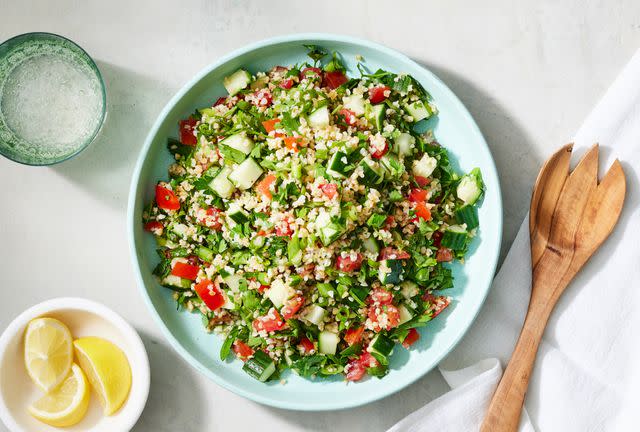
Rachel Marek
Breakfast (280 calories)
1 slice sprouted-wheat bread, toasted
1 Tbsp. almond butter
1 cup low-fat plain kefir
A.M. Snack (268 calories)
¼ cup unsalted dry-roasted almonds
1 cup blackberries
Lunch (357 calories)
1 serving Chickpea Tuna Salad
P.M. Snack (244 calories)
1 (5.3-oz.) container low-fat plain skyr yogurt
3 Tbsp. sliced almonds
¼ cup blueberries
Dinner (354 calories)
1 serving Easy Chicken Tenders with Lemon & Garlic
1 serving Parsley Tabbouleh
Daily Totals: 1,503 calories, 78g fat, 100g protein, 110g carbohydrate, 29g fiber, 1,411mg sodium
Make it 1,200 calories: Omit almonds at A.M. snack and sliced almonds at P.M. snack.
Make it 2,000 calories: Add 1 serving Strawberry-Banana Green Smoothie to breakfast and 1 medium banana with 1 Tbsp. almond butter to lunch.
Day 7
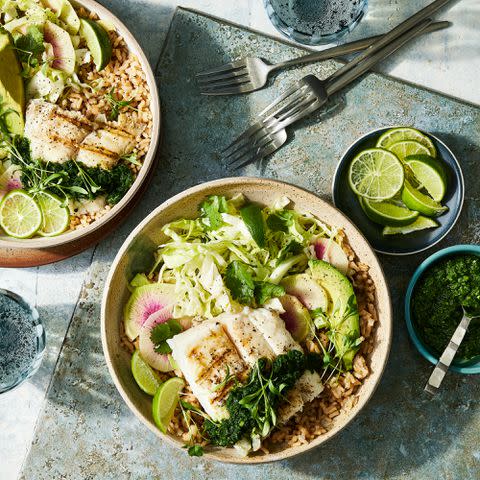
Breakfast (323 calories)
1 (5.3-oz.) container low-fat plain skyr yogurt
½ cup cherries, fresh or thawed from frozen
3 Tbsp. sliced almonds
1 Tbsp. chia seeds
A.M. Snack (193 calories)
1 medium apple
1 Tbsp. almond butter
Lunch (357 calories)
1 serving Chickpea Tuna Salad
P.M. Snack (105 calories)
1 medium banana
Dinner (529 calories)
1 serving Fish Taco Bowls with Green Cabbage Slaw
Daily Totals: 1,506 calories, 69g fat, 87g protein, 145g carbohydrate, 32g fiber, 1,252mg sodium
Make it 1,200 calories: Omit sliced almonds at breakfast and almond butter at A.M. snack, plus change P.M. snack to ¼ cup blueberries.
Make it 2,000 calories: Increase to 3 Tbsp. almond butter at A.M. snack, and add ¼ cup unsalted dry-roasted almonds to P.M. snack and 1 serving Tart Cherry Nice Cream as an evening snack.
Read the original article on Eating Well.

